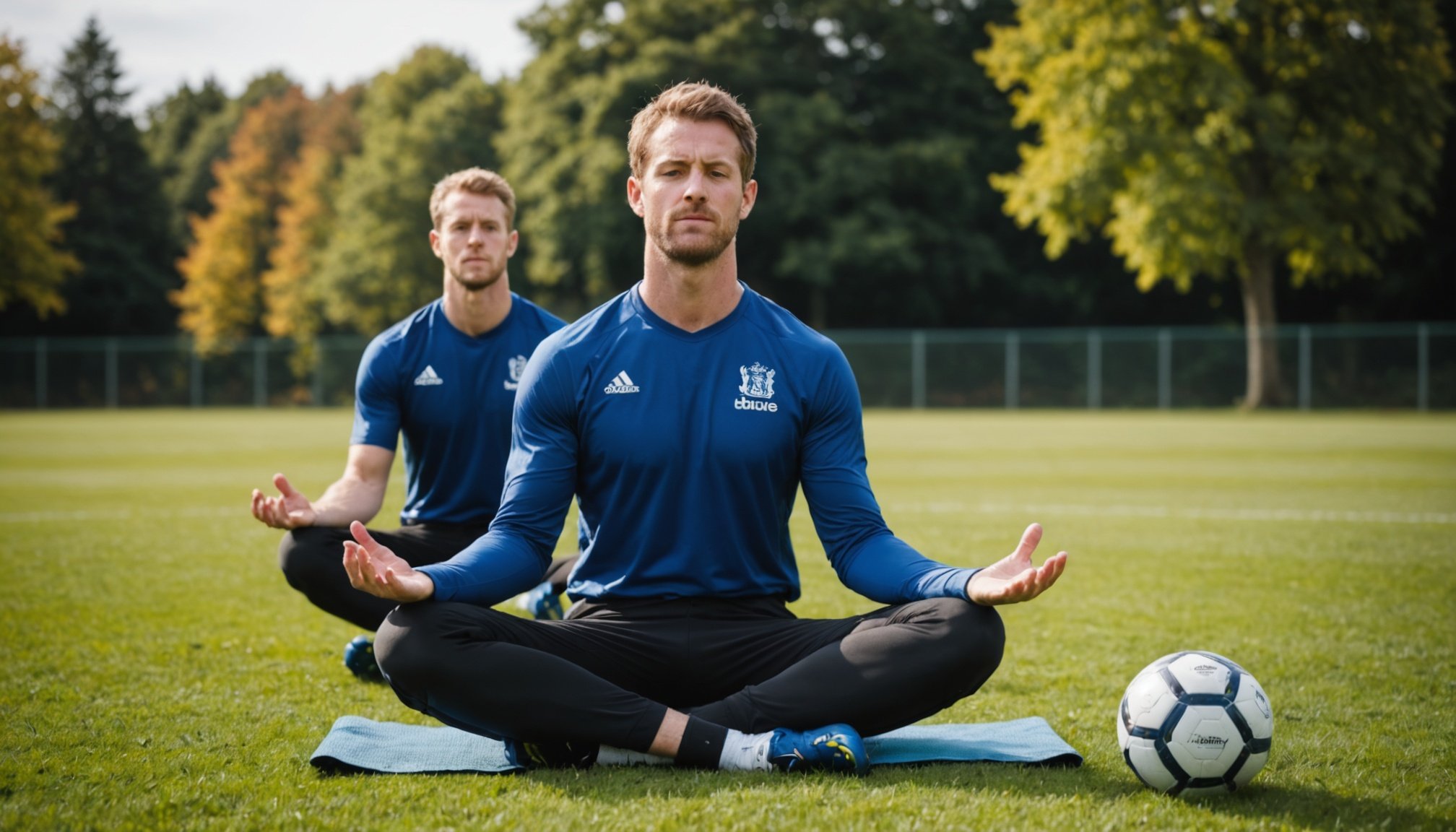Elevating Performance: The Role of Mindfulness Techniques in UK Sports Teams
In the highly competitive world of sports, athletes and teams are constantly seeking ways to gain an edge over their competitors. One approach that has gained significant traction in recent years is the integration of mindfulness techniques into training and competition preparation. This article delves into the role of mindfulness in UK sports teams, exploring its benefits, practical applications, and the impact it has on both mental and physical performance.
Understanding Mindfulness in Sports
Mindfulness, a concept rooted in Eastern meditative traditions, involves being fully conscious of the present moment, including feelings, thoughts, and the surrounding environment. In the context of sports, mindfulness can be a powerful tool for athletes to manage pressure, improve concentration, and enhance overall performance.
In parallel : Essential Elements for Crafting a Winning Training Program for UK Triathletes
“Mindfulness is the ability to be fully conscious of the present moment’s feelings, thoughts, and surrounding environment,” explains an article on Sport Coach America. This awareness allows athletes to become more self-aware, feel calmer, and better manage their reactions to challenging situations[4].
Benefits of Mindfulness for Athletes
The benefits of mindfulness for athletes are multifaceted and can be seen in several key areas:
Also read : Enhancing Accessibility: Strategies for UK Sports Clubs to Support Athletes with Disabilities
Emotional Regulation and Stress Reduction
Mindfulness helps athletes manage negative thoughts and emotions, reducing anxiety and stress. This is particularly important in high-pressure situations where maintaining a calm and focused mindset can be the difference between success and failure.
“Mindfulness can strengthen our ability to handle high-stress situations and pressure, work with doubt and anxiety, help overcome injuries and stay focused and present in training and competition,” notes the True Athlete Project in partnership with British Fencing[2].
Improved Focus and Concentration
Mindfulness practices such as mindful breathing and visualization can enhance an athlete’s ability to focus and concentrate. These techniques help athletes stay present and centered, even in the midst of intense competition.
“Mindful breathing can increase bodily awareness, enhance focus, and regulate emotions. Athletes should notice reduced tension and increased relaxation, improved focus during training and competitions, and enhanced emotional regulation,” advises Sport Coach America[4].
Enhanced Physical Performance
By being more attuned to their bodies, athletes can improve their physical performance. Mindfulness helps in developing better body awareness, which can lead to more efficient and effective movement.
“Mindfulness can benefit an athlete’s awareness of their own bodily movements, patterns of breathing, and physical sensations, which can lead to an athlete being more attuned to their body during practices and competitions,” explains a study on the effects of mindfulness on athletic performance[4].
Practical Applications of Mindfulness in UK Sports Teams
Several UK sports teams and organizations have integrated mindfulness into their training programs, with significant positive outcomes.
Mindful Breathing and Visualization
These are two of the most commonly used mindfulness techniques in sports.
-
Mindful Breathing:
-
Purpose: Increase bodily awareness, enhance focus, and regulate emotions.
-
Method: Athletes lie down or sit comfortably, close their eyes, and focus on the sensation of the breath entering and exiting the nostrils or the rise and fall of the chest.
-
Expected Outcomes: Reduced tension, improved focus, and enhanced emotional regulation[4].
-
Visualization:
-
Purpose: Prime the mind for optimal performance, instil confidence, and enhance mental preparation.
-
Method: Athletes visualize themselves performing successfully in various scenarios, emphasizing the importance of regular practice.
-
Expected Outcomes: Improved mental resilience, reduced anxiety, and enhanced ability to execute skills effectively under pressure[4].
The True Athlete Project
The True Athlete Project, in partnership with British Fencing, is a prime example of how mindfulness is being integrated into athlete development programs. This project focuses on mentoring, compassionate communication, emotional intelligence, and mindfulness for sport performance.
“Our mission is to support athletes on the talent pathway to ‘thrive’, not just ‘survive’. We want athletes to experience increased self-awareness, profound personal and social development, enhanced perception of what it means to be an athlete, and improved physical and mental wellbeing,” says Laurence Halsted, an Olympic fencer involved in the project[2].
Case Studies and Success Stories
Several high-profile athletes and coaches have attributed their success to mindfulness practices.
Jayne Storey and Chi Performance
Jayne Storey, the creator of the Chi Performance approach, has worked with golfers from the PGA Champions, European, LET, and LPGA Tours. Her method, which combines Eastern arts like Buddhist meditation, Chi Kung, and Tai Chi, helps athletes perform under pressure by achieving a state of natural, effortless movement.
“Jayne’s approach is about releasing complex sporting movements in the most natural way, attaining ever higher levels of performance and enjoyment. This is achieved through deep practice, which helps athletes attain freedom and spontaneity of movement,” explains the Chi Performance website[1].
CEP Mindset
CEP Mindset, a mental performance coaching firm, has worked with thousands of athletes to improve their mindset and achieve consistent elite performance. Dr. Cassidy Preston, the founder, emphasizes the importance of mindfulness in breaking free from the weight of results and performing with confidence.
“Mindfulness can help athletes get out of their head and achieve consistent elite performance. Our strategies are designed to be practical and personalized, delivering repeatable and reliable results,” says Dr. Preston[3].
Comparative Analysis of Mindfulness Approaches
Here is a comparative analysis of different mindfulness approaches used in sports:
| Approach | Key Components | Benefits | Examples |
|---|---|---|---|
| MAC (Mindfulness-Acceptance-Commitment) | Integrates acceptance commitment therapy (ACT) and mindfulness-based cognitive therapy (MBCT) | Improves mindfulness, sports performance, and psychological flexibility | Used in various sports including badminton, shooting, and golf[5] |
| MAIC (Mindfulness-Acceptance-Commitment with Insight) | Adds an insight component to MAC, integrating Eastern context | Larger effect sizes in mindfulness, sports performance, and psychological flexibility compared to MAC | Employed in sports like basketball, football, and volleyball[5] |
| MSPE (Mindful-Sport-Performance-Enhancement) | Focuses on mindfulness and acceptance to enhance sport performance | Enhances mental preparation, reduces anxiety, and improves execution of skills | Used by athletes to prepare for competitions and high-pressure situations[5] |
| Chi Performance | Combines Eastern arts like Buddhist meditation, Chi Kung, and Tai Chi | Achieves natural, effortless movement, reducing technical and mental game thinking | Applied to golf and other sports to improve performance and enjoyment[1] |
Player Insights and Testimonials
Athletes who have incorporated mindfulness into their training often report significant improvements in their performance and overall wellbeing.
-
Laurence Halsted, Olympic Fencer:
“For athletes, the ADP’s mission is to support athletes on the talent pathway to ‘thrive’, not just ‘survive’. Mindfulness has been instrumental in this, helping athletes experience increased self-awareness and improved physical and mental wellbeing”[2]. -
Athlete Feedback on Chi Performance:
“I was interested in Jayne’s book Breathe GOLF and its applications for both golf and music. The book is extremely vivid, practical, and is in itself its own practice. I find this book applicable to all areas of life, not just golf”[1].
Practical Advice for Implementing Mindfulness in Sports Training
For coaches and athletes looking to integrate mindfulness into their training, here are some practical steps:
-
Start with Body Scan Exercises:
-
Have athletes lie down or sit comfortably, close their eyes, and take a few deep breaths to relax.
-
Guide them through a body scan, focusing on different parts of the body to release tension and increase awareness[4].
-
Incorporate Mindful Breathing:
-
Introduce mindful breathing sessions into training routines, using them before and after practice or during breaks.
-
Encourage athletes to focus on the sensation of the breath entering and exiting the nostrils or the rise and fall of the chest[4].
-
Use Visualization Techniques:
-
Emphasize the importance of regular visualization practice, recommending short sessions daily or several times a week.
-
Encourage athletes to visualize themselves performing successfully in various scenarios to build confidence and mental preparation[4].
-
Make Mindfulness a Consistent Part of Training:
-
Consistency is key to developing the skills necessary to utilize mindfulness effectively in high-pressure situations.
-
Adapt mindfulness sessions to meet the specific needs of your athletes, ensuring they are receiving the correct strategies to enhance their performance[4].
Mindfulness techniques have become an integral part of modern sports training, offering athletes a powerful tool to enhance their performance, manage stress and anxiety, and improve their overall wellbeing. By understanding the benefits, practical applications, and success stories associated with mindfulness, UK sports teams can gain a significant competitive edge.
As Jayne Storey of Chi Performance aptly puts it, “The natural way to release your movement skills is not to be found in overly working and reworking your technique, nor in psychological and mental game interventions. It is found in achieving a state of natural, effortless movement through deep practice and mindfulness”[1].
By embracing mindfulness, athletes can not only improve their athletic performance but also cultivate a healthier, more balanced approach to their sport and life.











